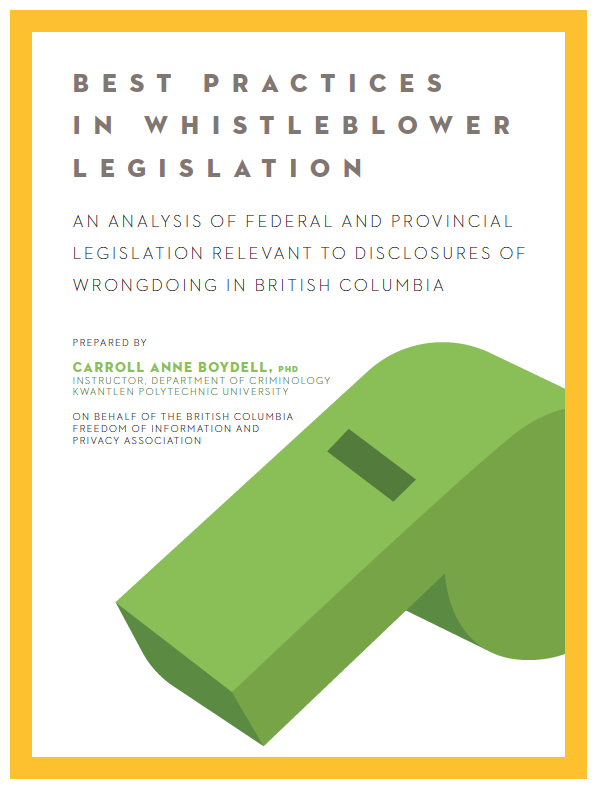
Bob Mackin
British Columbia’s whistleblower law is incomplete, says a new report for the B.C. Freedom of Information and Privacy Association.
The report, by Kwantlen Polytechnic University criminology professor Caroll Anne Boydell, said whistleblowers in the public and private sectors need protection because they have been critical to detect corruption and disclose wrongdoing.
British Columbia was one of the last Canadian jurisdictions with such a law, the Public Interest Disclosure Act, which was enacted by the NDP government last May to protect provincial government employees. It does not go far enough, writes Boydell.
“Broader definitions of whistleblowers, such as private sector workers, and broader definitions of protected disclosures, such as those pertaining to interference with FOI requests, are needed,” said the report. “In addition, more provisions are required in the law to protect the identities of disclosers and afford them more access to information about outcomes of investigations.”
The report said it is critical that best practices inform new or amended whistleblower protection laws, “to ensure that all whistleblowers in Canada are protected with metal and not cardboard shields.”
The report cited Tim Duncan, who blew the whistle on a fellow staffer in the B.C. Transport Minister’s office for ordering him to delete email about the Highway of Tears rather than disclosing it to an FOI requester. Information Commissioner Elizabeth Denham found this was a routine practice in the BC Liberal government. In 2016, George Gretes pleaded guilty to wilfully misleading Denham’s investigation about triple-deleting.
“Duncan concluded his letter to OIPC stating that it is ‘[his] belief that the abuse of the Freedom of Information process is widespread and most likely systematic’. Since this case, the practice of triple deletion of emails has been banned by the government,” the report said. “Without Duncan’s disclosure of wrongdoing, this practice of interference with access to information requests by destroying email records may have been permitted to continue.”
Boydell’s report also mentioned the firing of Service Canada fraud investigator Sylvie Therrien, who told a Montreal newspaper that she and fellow workers were ordered to meet quotas to reduce employment insurance payments in a bid to save $485,000 a year. Therrien eventually filed for personal bankruptcy, but is contesting her wrongful termination in court, five years after her disclosure.
“Legal protections for whistleblowers are clearly needed to prevent what can be severe reprisals for disclosure of wrongdoing and, as a result, remove any fear that someone with knowledge of wrongdoing might have that prevents them from disclosing it. Such protections increase the likelihood of openness and accountability in both public and private sector workplaces and entrench the right of citizens to disclose wrongdoing, which benefits society.”
It is an offence under the Criminal Code to prevent or punish an employee for disclosing information to law enforcement that an employer, fellow worker, or corporate director has committed a criminal act. B.C.’s FOI law does prohibit a public body employer from engaging in reprisals against an employee who discloses offences related to the act or refuses to engage in actions to break the act.
“There are still some disclosures of wrongdoing that may remain unprotected, such as interference with freedom of information requests. Some issues were also found related to transparency of decisions made about investigations into disclosures of wrongdoing and complaints of reprisal against whistleblowers, as well as about the accountability of government agencies in protecting whistleblowers.”
Support theBreaker.news for as low as $2 a month on Patreon. Find out how. Click here.











